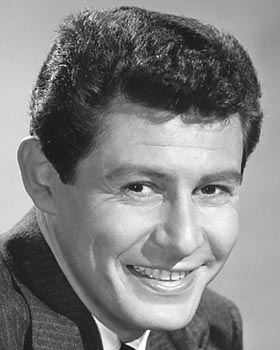Eddie Fisher (Edwin Jack Fisher)

By 1946, Eddie Fisher was crooning with the bands of Buddy Morrow and Charlie Ventura. He was heard in 1949 by Eddie Cantor at Grossinger’s Catskill Resort Hotel in the Borscht Belt. Cantor’s so-called discovery of Fisher was later described as a totally contrived, “manipulated’ arrangement by Milton Blackstone, Grossinger’s publicity director. After performing on Cantor’s radio show he was an instant hit and gained nationwide exposure. He then signed a recording contract with RCA Victor. Eddie Fisher was drafted into the U.S. Army in 1951, sent to Fort Hood, Texas for basic training, and served a year in Korea. From 1952 to 1953, he was the official vocal soloist for The United States Army Band (Pershing’s Own) and a tenor section member in the United States Army Band Chorus (an element of Pershing’s Own) assigned at Fort Myer in the Washington, D.C. Military District. During his active duty period, he also made occasional guest television appearances, in uniform, introduced as “PFC Eddie Fisher”. After his discharge, he became even more popular singing in top nightclubs. He also had a variety television series, Coke Time with Eddie Fisher (NBC) (1953–1957), appeared on The Perry Como Show, Club Oasis, The Martha Raye Show, The Gisele MacKenzie Show, The Chesterfield Supper Club and The George Gobel Show, and starred in another series, The Eddie Fisher Show (NBC) (1957–1959, alternating with Gobel’s series).
A pre–rock and roll vocalist, Fisher’s strong and melodious tenor made him a teen idol and one of the most popular singers of the early 1950s. He had 17 songs in the Top 10 on the music charts between 1950 and 1956 and 35 in the Top 40. In 1956, Eddie Fisher costarred with then-wife Debbie Reynolds in the musical comedy Bundle of Joy. He played a dramatic role in the 1960 drama BUtterfield 8 with second wife Elizabeth Taylor. His best friend was showman and producer Mike Todd, who died in a plane crash in 1958. Fisher’s affair and subsequent marriage to Taylor, Todd’s widow, caused a show business scandal because he and Reynolds had a very public divorce. Because of the unfavorable publicity surrounding the affair and divorce, NBC canceled Fisher’s television series in March 1959. Beginning in fall 1959, he established two scholarships at Brandeis University, one for classical and one for popular music, in the name of Eddie Cantor. In 1960, he was dropped by RCA Victor and briefly recorded on his own label, Ramrod Records. He later recorded for Dot Records. During this time, he had the first commercial recording of “Sunrise, Sunset” from Fiddler on the Roof. This technically counts as the biggest standard Fisher can claim credit for introducing, although it is rarely associated with him. He also recorded the albums Eddie Fisher Today and Young and Foolish (both 1965). The Dot contract was not successful in record sales terms, and he returned to RCA Victor and had a minor single hit in 1966 with the song “Games That Lovers Play” with Nelson Riddle, which became the title of his best selling album. When Fisher was at the height of his popularity, in the mid-1950s, singles, rather than albums, were the primary recording medium. His last album for RCA Victor was an Al Jolson tribute, You Ain’t Heard Nothin’ Yet, released in 1968. In 1983 he attempted a comeback tour but this was not a success. Eddie Fisher’s last released album was recorded around 1984 on the Bainbridge record label. Fisher tried to stop the album from being released, but it turned up as After All. The album was produced by William J. O’Malley and arranged by Angelo DiPippo. DiPippo, a world-renowned arranger, worked with Eddie countless hours to better his vocals but it became useless. His final recordings (never released) were made in 1995 with the London Philharmonic Orchestra. According to arranger-conductor Vincent Falcone in his 2005 autobiography, Frankly: Just Between Us, these tracks were “…the best singing of his life.” Fisher performed in top concert halls all over the United States and headlined in major Las Vegas showrooms. He headlined at the Palace Theater in New York City as well as London’s Palladium.
Eddie Fisher created interest as a pop culture icon. Betty Johnson’s “I Want Eddie Fisher For Christmas”, containing references to a number of hit songs, reached #28 in the Music Vendor national survey during an 11-week chart run in late 1954. Fisher has two stars on the Hollywood Walk of Fame, one for recording, at 6241 Hollywood Boulevard, and one for television, at 1724 Vine Street. Fisher broke his hip on September 9, 2010, and died 13 days later on September 22, 2010 at his home in Berkeley, California, from complications from hip surgery. He was 82 years old.
Born
- August, 10, 1928
- USA
- Philadelphia, Pennsylvania
Died
- September, 22, 2010
- USA
- Berkeley, California
Cause of Death
- complications from hip surgery
Cemetery
- Cypress Lawn Memorial Park
- Colma, California
- USA



